Coffee Talk
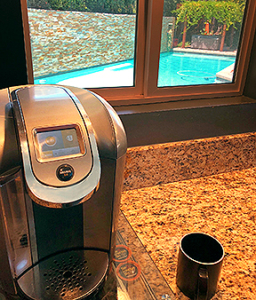
Home Sweet Home
This morning, while having my Keurig coffee, and slathering extra crunchy peanut butter on over-priced cinnamon bread, I heard the 911 call made by the Parkland, Florida shooter a few months before he entered the school and killed 17 people. The television newscaster announced that it was “coming up next,” so I patiently waited for it through the commercials for Cialis, Mercedes Benz, and Living Spaces for their Last Chance to Save President’s Day Sales Event. As the commercials droned on, I stared out the kitchen window and watched my two dogs chase each other around the pool. I made a mental note to talk to the gardener and pool cleaner about what a horrible job they are doing.
It was cold, and the heater in the house was on full blast. I had just asked Alexa to add dog treats to my Costco shopping list. She told me that it was added. I smiled at how easy certain things in my life had become. How perfectly insulated I was from the world’s problems in my middle-class cocoon.
And then I began to cry.
* * *
Lately, I have been struggling with the amount of hate and finger pointing that is taking center stage on a national, local and personal level. Each day as I wait for my order at a local café, watching others sip down their cappuccinos and crunch on their oh so trendy avocado toast, I can hear this hate spewing out from one conversation to the next.
“My daughter’s boss told her she looked sexy today, can you believe that? What an asshole, doesn’t he read the papers?”
“Screw, Trump, he’s an idiot.”
“That cop needs to be hung for shooting that kid.”
“Those policemen didn’t even go into the school when the shooting began, shame on them!”
Sip, sip, sip. Crunch, crunch, crunch.
“Why don’t they just take Cruz out and shoot him today?”
Sip, crunch.
Are we becoming a society of armchair dictators, complainers and judges?
Many of us we will never come near a gun. We will never know what it is like to be in harm’s way. We will never run a country, nor will we encounter true sexual harassment. But for some reason, we have become experts on what is right and wrong. Who is evil, and why—even before we hear their side of the story. Or, at least that is what we like to tell ourselves. If we are not indignant about one thing or another we don’t feel like we are alive. We have to take a side. We must have an opinion. And we need to do it immediately—lest someone thinks poorly of us.
In the perfect microcosm of my kitchen, I can easily tell you what is right and wrong. When I am sitting with friends or customers, I will certainly have an opinion about anything bad happening in the world. I may even curse the shooter, damn the police, and state what a horrible man he was for cheating on his wife. But when I’m in bed at night, or in my studio writing with no outside influence, I can’t help but wonder—is there another side to the story that I’m not hearing? Should I be so quick to take up the gauntlet and condemn the offender?
* * *
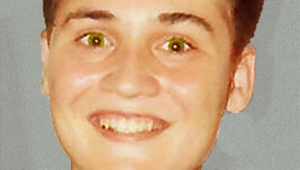
Author, Age 12
When I was in grammar school, I was a shy, awkward boy. The less shy, awkward boys would always pick on me and occasionally used me as their personal punching bag. As a young man with a nine-to-five desk job, I had a friend whose boss who would tell work associates to find him and “send in the fag.” His boss thought it was funny. I’m sure the boys who beat me up when I was young thought the same. I had a female boss who would look longingly at me and invite me for a drink “after work.” I was afraid to say no. I was fired from a job, by a new boss, because I was gay and he wanted his friend to take my place. He’d “be damned,” he told a co-manager of mine if he would have a queer working for him. I remember being so angry about that I could have shot him given the chance. Luckily for both of us, he was in Phoenix, and I was in Los Angeles. And, I didn’t have a gun.
Were all of these people evil? Could I have seen it in their eyes if I looked really hard? Can a thirteen-year-old boy, filled with rushing testosterone, be considered evil for beating up someone he felt was weaker? Were his parents evil for raising him? Is a woman evil for being attracted to a coworker under her management, and wanting to get to know him outside of work? Was my new boss who was from the South, and who had been raised to be fearful of homosexuals, wrong for not wanting me to work for him?
While memory can often play tricks on us, I remember a time when society seemed more open to having a conversation about—and with—the person behind the egregious act. To try and find hope for that individual vs. instantly condemning. Then again, there were no social networking sites to help us form a global consciousness.
We talked.
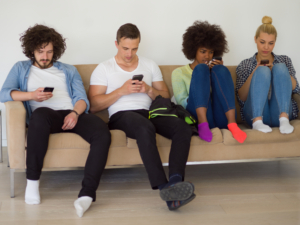
Conversing, circa 2018.
Today, long conversations and giving someone another chance are seemingly passé. All we need to do is sit in our kitchens or cafés, while staring at our smartphones and tablets, to know everything there is about a person. If a friend—or multiple posts on Facebook agrees—we become empowered to draw a hard line in the sand. We tell ourselves it’s the way it always should have been. There is no need to talk to the offender. To understand.
* * *
The 911 tape was heavily edited, but what stuck in my mind were short sound bites of Nikolas Cruz telling the operator that he got mad and punched holes into the walls of the mobile home where he had been staying. The people who owned the home, in turn, attacked him and told him to get out. “I was just assaulted now. He started attacking me, and he kicked me out of the house, and he said he was going to gut me,” Cruz said. Then he broke down crying and said, “The thing is I lost my mother a couple weeks ago, so, like, I’m dealing with a bunch of things right now”
He told them he got mad because he lost a picture of his mother who had died two weeks prior. The family in the house, who opened their doors to him and his younger brother when the mother passed, said that he got mad because they took his guns away.
He called 911 because he was hurting, and scared.
I cried for the seventeen people who were innocently killed at Marjory Stoneman Douglas High School when Cruz went on his rampage. But, I also cried for him. His world had completely crumbled, and he was screaming out for help, but none came. I could envision my nineteen-year-old son, sans the involvement of guns, making the same 911 call.
Is it wrong to feel sorry for the person who killed 17 innocent people?
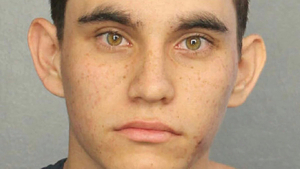
Nikolas Cruz (Photo: Broward County Sheriff’s Office)
As the camera panned into his eyes, I looked for the hate. I looked for the evil. I wanted to find it. All I saw was a scared nineteen-year-old boy who knew he lost it once again and this time fucked up so badly that no one would ever want or love him again.
As I stared out my window, drank my coffee, talked to Alexa, and mentally complained about the gardener and pool cleaner—I felt self-righteous. When I was slapped in the face with Cruz’s 911 call, I was cut down a few notches. I had a line in the sand to draw, and it was getting fainter and much less straight. Would I have kicked him out knowing that his mother had unexpectedly died two weeks prior? Was his anger from mental illness, or the cries of a young man who had not yet learned how to control himself? Should he be held fully to blame because, empowered by the NRA, Dick’s Sporting Goods sold him a gun without asking a question? If Cruz was in my kitchen with me, watching the dogs run around the pool and eating expensive cinnamon toast before I drove him to his psychologist, would he still have pulled the trigger? Would the man who fired me for being gay, still fire me if he spent one day getting to know me, and I him? I will never know.
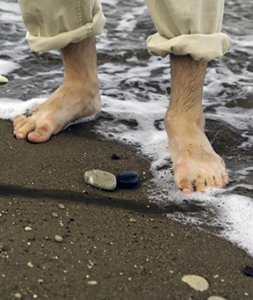
What side are you on?
What I do know is that I don’t want to immediately jump to a conclusion or deem someone as evil without understanding the person behind the offense. What brought them from being a sweet or precocious child to the point in their lives when they used their power to destroy another’s? Are they truly evil, or is there something else we need to understand and converse about?
Drawing a hard line in the sand is not necessarily a bad thing. It makes us think about what is right, or wrong. But no matter how deep you draw that line, tides will come in and wash it away.
Many of us live protected lives, sheltered in our nice homes with all of the conveniences life has to offer. I know that’s true of me. If there is something out of place, it’s easier to condemn the person who caused the problem, instead of conversing with them about why it happened, and what we can do to fix it. We live in a time when people are shouting: “Look at me. Look at what that person did to me,” instead of saying, “What gives, why did you do that? I need to understand.”
I’m by no means stating that we should forgive offenders such as Cruz, Weinstein, or even Trump. What I am saying is that instead of living our sheltered lives, maybe, just maybe, we need to back off from immediately spewing hate and try to converse with one another about what we can do to fix the problems. Perhaps nobody could have helped or fixed Cruz, but all the signs were there and were ignored. Looking back on my life, I can find multiple people who hurt me in one form or another. I’m sure that I have hurt many people as well. It seems there has to be a way to return to the days—pre-iPhones, pre-Facebook, and pre-any social media—when we talked with one another face-to-face, offender to offended. When we had to stop and think. When we tried to fix the problem instead of immediately digging deep lines in the sand just so we knew which side to stand on.
I want to hate Cruz, but now knowing some of his history, I’m just sad. I want to leave nasty notes for both my gardener and the pool guy. It could be that they’re just doing a lousy job, but maybe there are other forces at work that I don’t know about. So, for now, I’ll probably just talk to them, and maybe even invite them in to have coffee and cinnamon toast with me.
Sip, sip. Crunch, crunch.
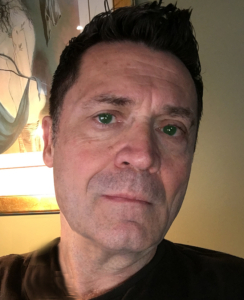
Girard Parent
Girard (Jerry) Parent is a current MFA candidate in Creative Writing at Antioch University Los Angeles. He is serving as Lunch Ticket’s Flash Prose Editor. He earned his B.A. in Philosophy from St. John’s Seminary College, and currently resides in San Diego with his husband, son, two dogs and one cat. He and his husband own one of San Diego’s oldest floral companies, Adelaide’s, located in the village of La Jolla.





